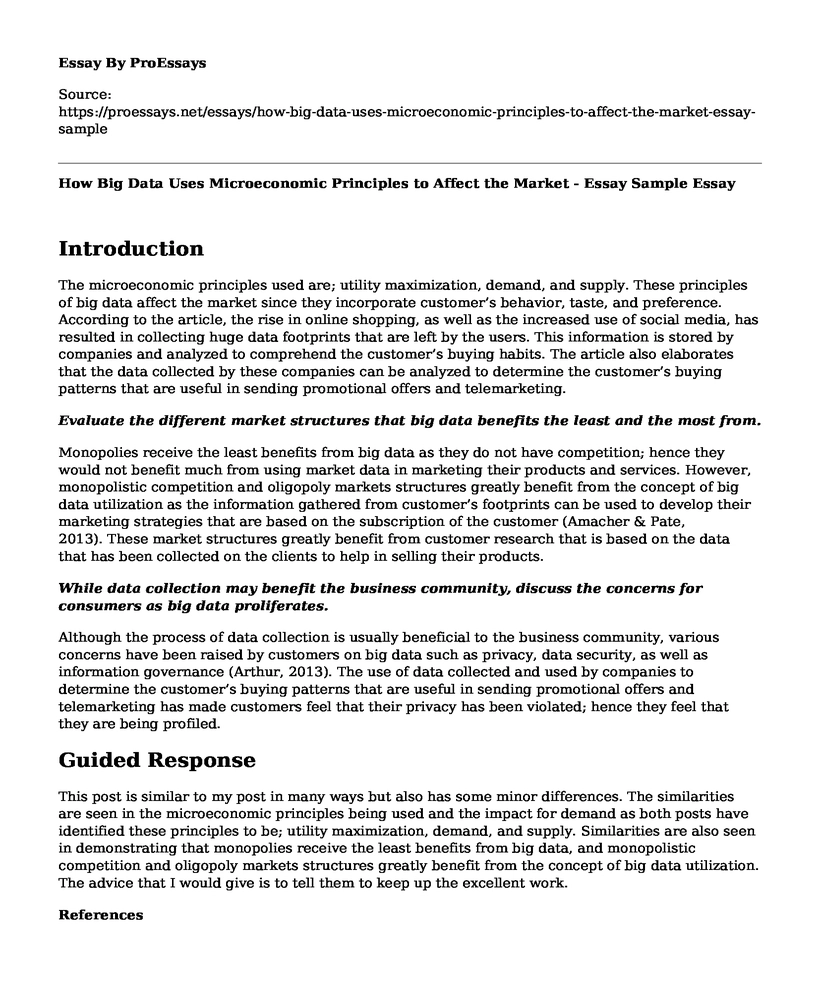Introduction
The microeconomic principles used are; utility maximization, demand, and supply. These principles of big data affect the market since they incorporate customer’s behavior, taste, and preference. According to the article, the rise in online shopping, as well as the increased use of social media, has resulted in collecting huge data footprints that are left by the users. This information is stored by companies and analyzed to comprehend the customer’s buying habits. The article also elaborates that the data collected by these companies can be analyzed to determine the customer’s buying patterns that are useful in sending promotional offers and telemarketing.
Evaluate the different market structures that big data benefits the least and the most from.
Monopolies receive the least benefits from big data as they do not have competition; hence they would not benefit much from using market data in marketing their products and services. However, monopolistic competition and oligopoly markets structures greatly benefit from the concept of big data utilization as the information gathered from customer’s footprints can be used to develop their marketing strategies that are based on the subscription of the customer (Amacher & Pate, 2013). These market structures greatly benefit from customer research that is based on the data that has been collected on the clients to help in selling their products.
While data collection may benefit the business community, discuss the concerns for consumers as big data proliferates.
Although the process of data collection is usually beneficial to the business community, various concerns have been raised by customers on big data such as privacy, data security, as well as information governance (Arthur, 2013). The use of data collected and used by companies to determine the customer’s buying patterns that are useful in sending promotional offers and telemarketing has made customers feel that their privacy has been violated; hence they feel that they are being profiled.
Guided Response
This post is similar to my post in many ways but also has some minor differences. The similarities are seen in the microeconomic principles being used and the impact for demand as both posts have identified these principles to be; utility maximization, demand, and supply. Similarities are also seen in demonstrating that monopolies receive the least benefits from big data, and monopolistic competition and oligopoly markets structures greatly benefit from the concept of big data utilization. The advice that I would give is to tell them to keep up the excellent work.
References
Amacher R., Pate J, (2013). Microeconomics Principles and Policies San Diego CA Bridgepoint Education inc
Arthur, L. (2013). What Is Big Data? Forbes Magazine. Retrieved from: https://www.forbes.com/sites/lisaarthur/2013/08/15/what-is-big-data/#399a9f105c85
Cite this page
How Big Data Uses Microeconomic Principles to Affect the Market - Essay Sample. (2023, Aug 02). Retrieved from https://proessays.net/essays/how-big-data-uses-microeconomic-principles-to-affect-the-market-essay-sample
If you are the original author of this essay and no longer wish to have it published on the ProEssays website, please click below to request its removal:
- Information Theory: Coding Theorems for Discrete Memoryless Systems Essay
- Research Paper on Globalization and Populism
- Essay Sample on Cyber Crime and Cyber Security
- The Elasticity of a Product: Claire's Makeup Products Paper Example
- Essay Example on Maximizing Employee Productivity With Human Resource Strategies
- Unlocking the Macroeconomic Potential of Colombia - Essay Sample
- Essay Sample:The Great Recession's Impact on People with Disabilities







